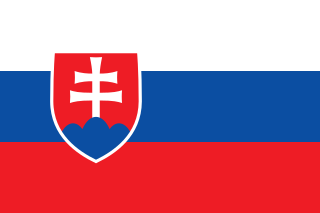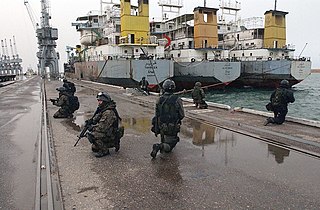Training
The NADSTF members are trained to use special operative and intelligence techniques. The members are often sent under coverage to the criminal territory. After working on a target, raising information and evidence the members prepare an attack or arrests directly on the crime scene. The purpose of the actions is to save the evidence, not just arresting criminals, who could later be released because of the lack of evidence.

An arrest is the act of apprehending a person and taking them into custody, usually because they have been suspected of committing or planning a crime. After the person is taken into custody, they can be questioned further and/or charged. An arrest is a procedure in a criminal justice system.

A crime scene is any location that may be associated with a committed crime. Crime scenes contain physical evidence that is pertinent to a criminal investigation. This evidence is collected by crime scene investigators (CSIs) and Law enforcement. The location of a crime scene can be the place where the crime took place, or can be any area that contains evidence from the crime itself. Scenes are not only limited to a location, but can be any person, place, or object associated with the criminal behaviors that occurred.

Evidence, broadly construed, is anything presented in support of an assertion. This support may be strong or weak. The strongest type of evidence is that which provides direct proof of the truth of an assertion. At the other extreme is evidence that is merely consistent with an assertion but does not rule out other, contradictory assertions, as in circumstantial evidence.
Members of the NADSTF undergo significant tactics trainings with an accent on arresting armed criminals in difficult situations (in a car, in a street, in public places, with hostages, or explosives). Such trainings prepare the NADSTF members for all kinds of psychic ballast, which can confront them on duty. Only real ammunition is used for the practice, which takes place in real environment in buildings and cars. Thus, the members of the NADSTF are well-prepared to collect intelligence information, protect themselves and arrest highly dangerous criminals.

The Massachusetts Bay Transportation Authority Police is a police force which has primary jurisdiction on Massachusetts Bay Transportation Authority (MBTA) property and vehicles in each of the 175 cities and towns within the MBTA. The department has grown to an authorized strength of 266 officers and 10 civilians. The majority of the MBTA Police Department's efforts are focused on patrol in Boston and surrounding communities. The department patrols and protects the 5 subway lines to include the Silver Line, 13 commuter rail lines, 4 passenger ferry routes, 181 bus routes and The Ride paratransit system in Massachusetts communities.
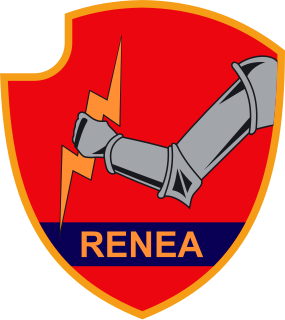
The Department of Neutralization of Armed Elements commonly known by its acronym RENEA, is the main Albanian counter-terrorist and critical incident response unit. The force was constituted in the early 1990s in response to the growing crime levels in the country after the fall of communism. RENEA's responsibilities are rescue operations, hostage situations, counter-terrorism and response to particularly violent forms of crime. Since 1990, the unit has lost four men in action and more than forty wounded. Their skills are highly regarded and well thought-of inside Albania and in the West, they are reported to have one of the highest OPTEMPOs in all of Europe and they have been trained by GSG 9.
A firearms unit is an armed unit within each territorial police force in the United Kingdom. For the most part, the police forces of the United Kingdom are unarmed; however, all have firearms units to provide the police force with the capability to deal with terrorists and armed criminals. A police officer cannot apply to join the firearms unit without first finishing their two-year probationary period, with a further two years in a core policing role for some forces. Firearms unit is the most common name outside of the capital, while that of London's Metropolitan Police Service is called the Specialist Firearms Command, Trojan or SC&O19. Within the media it is sometimes compared to the SWAT units of the United States.
Unit 326 commonly known as Sampistët was an Albanian special forces group. It consisted of approximately 600 members. Its duties included counter-terrorism, riot control, search and rescue, and demolition. In some respect its duties were reminiscent of the British SAS. After 1991 the unit was abolished due to its controversial role and association with the Communist government of Albania, and its members were dispersed into subsequent special operations units such as RENEA, ROS, Shqiponjat, and the Commando Brigade.

The Halifax Regional Police (HRP) is one of a number of law enforcement agencies operating in the Halifax Regional Municipality, Nova Scotia; the other primaries being the Royal Canadian Mounted Police and the Canadian Forces Military Police. The city also is home to a small detachment of the Canadian National Railway Police.
See article: Law enforcement in Westchester County

The FBI Buffalo Field Office is the Federal Bureau of Investigation field office in Buffalo, New York, one of 56 field offices in the United States.
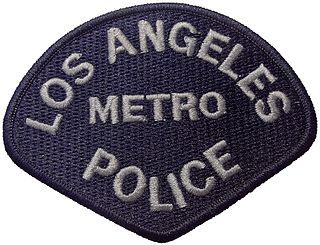
The Los Angeles Police Department Metropolitan Division, also known as Metro, is an elite division within the Los Angeles Police Department (LAPD). The Metro Division, which also contains LAPD's Special Weapons and Tactics (SWAT) team, contains seven platoons of specially-trained police officers. It is tasked with numerous crime-fighting duties including solving major crimes, surveillance, providing counter-terrorism details and attending high-risk barricaded situations, such as a hostage situation.

Police of the Czech Republic is the national law enforcement agency of the Czech Republic. It was established on 15 July 1991 under the jurisdiction of the Ministry of the Interior. The agency is tasked with protecting citizens, property and public order and as of 2015, there were around 40,500 employees. Czech state police cooperates with municipal police departments, which are present in local municipalities.
The Serious and Organised Crime Command is a unit of the Metropolitan Police in Greater London, United Kingdom. It is part of the Specialist Crime Directorate and is divided into 10 units:

The ARAS or Lithuanian Police Anti-terrorist Operations Unit ARAS is a separate specialized police unit established in 1991. At first, ARAS's main purpose was to suppress organized crime and the bandit groups that were freely operating in Lithuania. In addition, they handled riot suppression, peace keeping, and escort. In December 2004 the unit was admitted into the Atlas Network of special counter-terrorist police units of the European Union countries.

SWAT is an elite tactical unit of the Dhaka Metropolitan Police, Bangladesh. They operate under the Detective Branch of DMP. Eventually, the newly formed DMP unit SWAT is going to be expanded outwards forming one or more battalions. The force would remain as a part of the police force.

In 1786, Greenville County was formed. Greenville County was part of the Ninety Six District and was serviced by the Sheriff of that District. In 1791 a new district was formed to include Greenville and Pendleton Counties. This was named the Washington District and it existed until 1799. In 1795 Robert Maxwell, a Revolutionary War hero, was appointed as Sheriff of the District. He lived in Greenville County, and was killed by an ambush on November 10, 1797 while crossing the Saluda River shoals where Piedmont Mill Dam was later built. His grave is located fifteen miles south of Greenville, near Ware Place. During this time many important public officials, including the Sheriff, were elected to their position by the Legislature. The people of South Carolina, however, felt that this important position should answer directly to them for his actions and performance. In 1808, legislation was enacted to provide for the election of the Sheriff by the citizens of the county, rather than by politicians. This method of election was placed into our State Constitution in 1868. The Office of Sheriff in Greenville County began. The Greenville County Sheriff's Office has transformed from the ancient office created over a thousand years ago in England, to a New World colony, to a frontier county, to a modern, computerized law enforcement agency serving a busy metropolitan county of over 451,000 residents.

Maharashtra Police is the law enforcement agency responsible for the Indian state of Maharashtra. It is headed by Director General of Police and headquartered in Mumbai, Maharashtra.
The Columbia Police Department (CPD) is the principal law enforcement agency serving the city of Columbia, Missouri in the United States. It protects a metropolitan population of 120,000 with 150 police officers.
The National Surveillance Unit (NSU) is the principal clandestine intelligence gathering and surveillance operations unit of the Garda Síochána, the national police force of Ireland. The unit operates under the Crime & Security Branch (CSB), based at Garda Headquarters in the Phoenix Park, Dublin, and also works from Harcourt Street, Dublin. Members of the unit are specially trained and selected Detective Gardaí who are tasked to remain covert whilst on and off duty, tracking suspected criminals, terrorists and hostile, foreign spies operating in Ireland. The unit's detectives are routinely armed. The National Surveillance Unit is understood to possess a manpower of approximately 100 officers, and is considered to be the most secretive arm of the force.
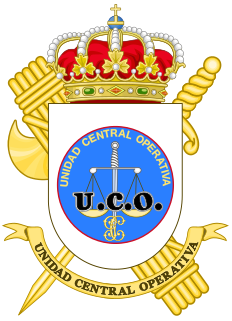
The Central Operative Unit (UCO) is a specialized division of the Civil Guard of Spain responsible for the investigation and prosecution of the most serious forms of crime and organized crime, whether national or international, as well as support to the Territorial Units of Judicial Police, that, due to lack of personnel or resources, or because the criminal field is more than one autonomous communities, require the support of this Unit.
